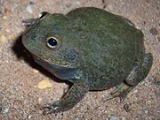
Cyclorana platycephala
Encyclopedia
Litoria platycephala the Water-holding Frog, is a frog common to most Australia
n states. It differs from most other members of the Hylidae family as a ground dweller and the ability to estivate.
and Tasmania
. It occupies a wide range of habitat from forests of tropical swamp to intermittent pools and lowland grass country; all habitat is assumed to be of a low elevation. Populations are assumed to be large from frequent reports and a broad range. This range is assumed to overlap with National parks, but research has not been undertaken into the ecology and biology of the species. The water holding frog is known to lay its eggs and once hatched go back into aestivation for a period of 3 - 6 months. After this period it will lay more eggs and repeat the process
is yet to be undertaken. The species is given Least Concern
status at the IUCN Red List
due to a wide range and large population.
Australia
Australia , officially the Commonwealth of Australia, is a country in the Southern Hemisphere comprising the mainland of the Australian continent, the island of Tasmania, and numerous smaller islands in the Indian and Pacific Oceans. It is the world's sixth-largest country by total area...
n states. It differs from most other members of the Hylidae family as a ground dweller and the ability to estivate.
Description
The species has populations spread across all the Australian states except VictoriaVictoria (Australia)
Victoria is the second most populous state in Australia. Geographically the smallest mainland state, Victoria is bordered by New South Wales, South Australia, and Tasmania on Boundary Islet to the north, west and south respectively....
and Tasmania
Tasmania
Tasmania is an Australian island and state. It is south of the continent, separated by Bass Strait. The state includes the island of Tasmania—the 26th largest island in the world—and the surrounding islands. The state has a population of 507,626 , of whom almost half reside in the greater Hobart...
. It occupies a wide range of habitat from forests of tropical swamp to intermittent pools and lowland grass country; all habitat is assumed to be of a low elevation. Populations are assumed to be large from frequent reports and a broad range. This range is assumed to overlap with National parks, but research has not been undertaken into the ecology and biology of the species. The water holding frog is known to lay its eggs and once hatched go back into aestivation for a period of 3 - 6 months. After this period it will lay more eggs and repeat the process
Threatened status
No threats have been identified, research into the extent of habitat loss through land clearing and the associated salinitySalinity
Salinity is the saltiness or dissolved salt content of a body of water. It is a general term used to describe the levels of different salts such as sodium chloride, magnesium and calcium sulfates, and bicarbonates...
is yet to be undertaken. The species is given Least Concern
Least Concern
Least Concern is an IUCN category assigned to extant taxon or lower taxa which have been evaluated but do not qualify for any other category. As such they do not qualify as threatened, Near Threatened, or Conservation Dependent...
status at the IUCN Red List
IUCN Red List
The IUCN Red List of Threatened Species , founded in 1963, is the world's most comprehensive inventory of the global conservation status of biological species. The International Union for Conservation of Nature is the world's main authority on the conservation status of species...
due to a wide range and large population.
Further reading
- Cogger, H.G. 2000. Reptiles and Amphibians of Australia, Sixth Edition. Reed New Holland, New South Wales.

